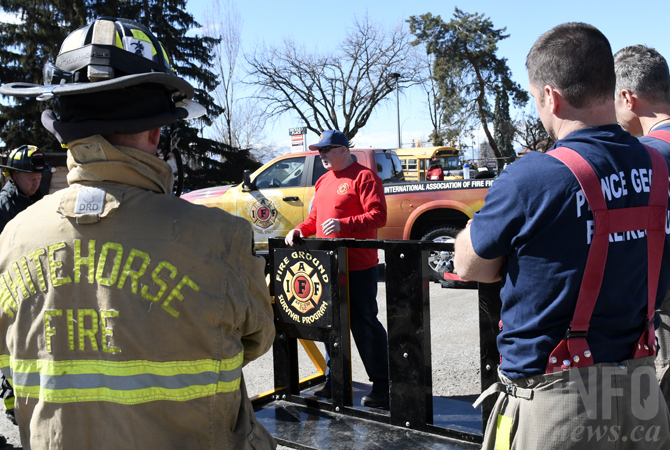Elevate your local knowledge
Sign up for the iNFOnews newsletter today!
Sign up for the iNFOnews newsletter today!
Selecting your primary region ensures you get the stories that matter to you first.

KELOWNA – Fire stations across Canada sent members to Kelowna this week to pick up and bring home knowledge that could save their lives one day.
For four days this week, close to 100 firefighters took part in a unique training seminar, designed to put them in situations that have previously resulted in a fatality for the firefighter.
Groups of around 30 spent the days learning how to extricate themselves from dangerous situations like entanglement, loss of visibility, equipment failure and more. Once they graduate from the program, they take what they learned back to their local stations.
Kyle Wiberg has been a firefighter in the Okanagan for 17 years. He says he jumped at the opportunity to learn new skills that could improve his safety and the safety of his team.
“I had a bit of an idea what to expect but it’s been a lot more intense than I thought it would be,” he says. “We’ve never truly had a course like this before. You hear lots about line of duty deaths and you have to learn from them.”
The Fire Ground Survival Training course was brought to Kelowna by the Kelowna Professional Firefighters Association and the B.C. Professional Firefighters Association.

Kevin Hassenauer is one of the six instructors who came up from the U.S. to help teach.
“There are a lot of classes out there on how to save firefighters,” he says. “This is the only class on the market that teaches you how to save yourself.”
He says repetition of new procedures is key to developing the muscle memory it takes to escape a potentially deadly situation.
“Every one of the skill stations is based on a previous line of duty death,” Toronto fire captain and Master Instructor Geoff Boisseau says. “If we don’t learn from firefighter fatalities, we’re doomed to make the same mistakes.”
Firefighters who graduate from the program qualify to travel around and teach others, but their main responsibility is to relay the information to their local members.
“It’s very humbling,” Hassenauer says. “When you hear that what you taught saved someone’s life, there’s no amount of money that compares to how that feels.”
To contact a reporter for this story, email Adam Proskiw or call 250-718-0428 or email the editor. You can also submit photos, videos or news tips to the newsroom and be entered to win a monthly prize draw.
We welcome your comments and opinions on our stories but play nice. We won't censor or delete comments unless they contain off-topic statements or links, unnecessary vulgarity, false facts, spam or obviously fake profiles. If you have any concerns about what you see in comments, email the editor in the link above.
News from © iNFOnews.ca, . All rights reserved.
This material may not be published, broadcast, rewritten or redistributed.

This site is protected by reCAPTCHA and the Google Privacy Policy and Terms of Service apply.
Want to share your thoughts, add context, or connect with others in your community?
You must be logged in to post a comment.